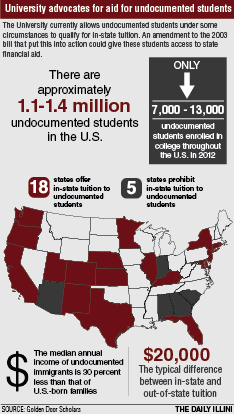University proposes legislation to change financial aid rules for undocumented students
March 3, 2015
Alberto Lara Valdivieso was nine years old when he came to Illinois from Tlalnepantla de Baz, Mexico with his family.
Growing up in Chicago, the junior in LAS said he could spot some of the differences between himself and his peers, but the gravity of his illegal status did not really occur to him until he began considering a college education.
“Being undocumented never really hit me until high school because then it was like ‘Oh, I have to pay for college, I don’t know any of the procedures for college,’” Valdivieso said.
To help students like him, University of Illinois administrators and students have been working to change legislation to provide undocumented students access to state financial aid. In an October meeting of the faculty. President Robert Easter said the University will carry forward to direct change on the issue.
Currently, undocumented students can attend universities in Illinois as long as they have graduated from an Illinois high school, lived with his or her parents and lived in the state for three years.
Get The Daily Illini in your inbox!
The legislation passed in 2003 allowed for undocumented students to receive in-state tuition; however, they cannot receive any financial aid from the state or the University. Illinois is one of 18 states that charge in-state tuition as long as students have met the requirements to attend the University.
In order to afford the cost of attendance, Valdivieso has to work and apply for private scholarships.
“It was very stressful the idea of not being able to afford school,” Valdivieso said. “Especially not being able to have loans, because either I get the money, or I get kicked out of school.”
Kristy Kambanis, assistant to the vice provost for diversity for the Chicago campus, is working with a task force to pass legislation to make undocumented students eligible for aid from the state.
“They’ve put draft language forward for an amendment to that bill, and that’s been submitted for final wording,” Kambanis said.
Amalia Pallares, co-chair of the Undocumented Student Task Force, said the bill is in the early stages of advocacy, which aims to find supporters of the legislation.
“Undocumented students have no access to federal funds, and we can’t change that until there’s a new immigration law at the federal level, but state legislators have the authority to decide how much state funding undocumented students have access to.” Pallares said.
Valdivieso said the processes of applying for school and obtaining financial aid can be “hurdles” for undocumented students like himself.
“It’s really unfair because you don’t know where to go, you don’t know who to contact,” Valdivieso said. “Especially because people who are undocumented who are of a lower socioeconomic status, we don’t know people who went to college, our parents didn’t attend a university or do schooling in this country, so the whole process is very foreign.”
Valdivieso said he had to call contacts outside of the University and was eventually directed to the Office of Minority Student Affairs, which guided him through the procedure of applying.
The Illinois Student Senate is reviewing a resolution in support of the legislation. The bill is currently tabled in the Committee on Community and Governmental Affairs but could be voted on at the student senate’s March 4 meeting, said ISS Vice President-External Matt Hill.
Valdivieso said he has never taken his education for granted and sees it as a privilege.
“Education is something I see, like, if you’re lucky you get it,” said Valdivieso. “I take my education very seriously. I wanted to pursue it in the sense that I want to go back to my country, and I want to help other students who are facing a similar situation.”
Beside financial burdens and language barriers, Valdivieso said skeptical attitudes toward undocumented people in the United States can be a source of stress to overcome.
“There are undocumented students from all over the world. We all have different histories and different pasts, and I think people need to see us as individuals not just immigrants just coming in and trying to get something out of it,” Valdivieso said. “We’re just trying to find our place in the world.”







